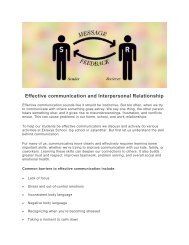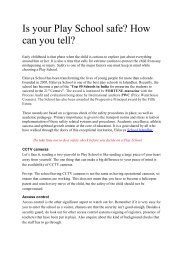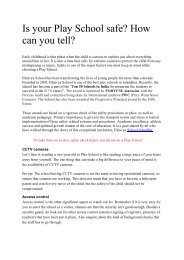Anger management
Frequent incidents of anger and rage expressed by adults in a socially inappropriate manner are a great cause for concern. Children learn from observing the adults around them. Eklavya School, Jalandhar; top school in Jalandhar; teaches students how to express their emotions and feelings in a socially acceptable manner. Here are some tips on anger management.
Frequent incidents of anger and rage expressed by adults in a socially inappropriate manner are a great cause for concern. Children learn from observing the adults around them. Eklavya School, Jalandhar; top school in Jalandhar; teaches students how to express their emotions and feelings in a socially acceptable manner. Here are some tips on anger management.
Create successful ePaper yourself
Turn your PDF publications into a flip-book with our unique Google optimized e-Paper software.
ANGER MANAGEMENT<br />
Frequent incidents of anger and rage expressed by adults in a socially inappropriate manner are a<br />
great cause for concern. Children learn from observing the adults around them. Eklavya School,<br />
Jalandhar; top school in Jalandhar; teaches students how to express their emotions and feelings in<br />
a socially acceptable manner. Here are some tips on anger <strong>management</strong>.<br />
WHAT IS ANGER ?<br />
<strong>Anger</strong> is a normal human emotion, but when it gets out of control it can become destructive,<br />
leading to serious problems at work and in personal relationships. It can undermine a person's<br />
quality of life.<br />
WHAT IS ANGER MANAGEMENT ?<br />
<strong>Anger</strong> <strong>management</strong> involves skills of recognizing the signs of anger, and taking action to deal<br />
with the situation in a positive way. It does not mean holding the anger in or avoiding angry<br />
feelings. <strong>Anger</strong> is a normal, healthy emotion when expressed appropriately.<br />
<strong>Anger</strong> <strong>management</strong> teaches people how to recognize frustrations at an early stage, and to settle<br />
them in a way that allows the person to express their needs, while remaining calm and in control.<br />
STRATEGIES TO MANAGE ANGER FOR YOUR CHILD
Ask yourself why you’re angry (problem solve). If you ask yourself why you’re angry, and<br />
really think about your answer, you might figure out a problem you can solve or even uncover<br />
some of the sneaky feelings that feel like anger.<br />
Use “if–then” statements to consider the consequences. If–then statements mean that you ask<br />
yourself what might happen if you do something. They are best used when you are deciding what<br />
to do about a situation or problem. If–then statements help you make better choices by helping<br />
you understand the consequences of your actions.<br />
Count up to or down from 10. Sometimes, quietly counting to 10 is something some people do<br />
to stop themselves from doing something too quickly. Counting to 10 as soon as you notice<br />
you’re having an angry reaction can give an angry person just enough think time to make sure<br />
their first idea is a good idea<br />
Listen to another person. If you’re angry about something or with someone else, talking to<br />
someone and listening to their perspective—even the person you’re angry with—may help you<br />
understand exactly what caused the problem so you can fix it.<br />
Focus on your breathing. Focusing on breathing can help during angry moments in several<br />
ways. First, it takes your attention away from the anger for a moment, just like when you count<br />
to 10.<br />
Second, breathing in a certain way, slowly and deeply (so deeply that your belly moves, too), and<br />
in through your nose and out through your mouth, can often help people who are angry to begin<br />
to calm down.<br />
Take a walk or step away. Change the environment by taking a walk or stepping away if you<br />
can. Just like counting to 10, and thinking about your breathing, walking away from a situation<br />
that is making you angry can sometimes help prevent you from reacting to a situation too.<br />
Give yourself some good advice (self-talk). Self-talk means that you say to yourself the things<br />
that a good friend would say to calm you down, such as, “Calm down,” “Maybe it’s not that<br />
bad,” or “Let it go.” It is best used when you first notice that you are angry (emotional reaction<br />
stage). Its purpose is to help calm you down.<br />
Look for the humor—without making fun of someone. Sometimes we get angry for silly<br />
reasons that are hard to explain. Maybe you don’t even really want to be angry. Sometimes, if<br />
there is no danger, you can count to 10 and imagine what it must look like if this whole angry<br />
situation was something you were watching in a TV comedy. Sometimes, when you really think<br />
about it, some of the things that make us angry can seem really silly.<br />
SUGGESTIONS FOR LONG-TERM ANGER MANAGEMENT<br />
• Keep a diary of your anger outbursts, to try and understand how and why you get mad.<br />
• Consider assertiveness training, or learning about techniques of conflict resolution.
• Learn relaxation techniques, such as meditation or yoga.<br />
• See a counselor or psychologist if you still feel angry about events that occurred in your<br />
past.<br />
• Exercise regularly.
















